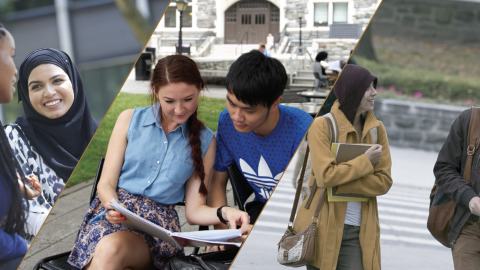Academic Offerings
The Colin Powell School is home to CCNY’s social science departments, as well as the College’s core leadership development and public service programs. It is uniquely positioned to form the first of its kind Student Mobility Lab designed to better understand and invest in those factors that contribute to the upward trajectory of our students.
Below are a selection of courses that directly focus on this issue. In addition, this topic is also addressed within many core sociology, psychology, economics and anthropology courses.
ECO33851 – Economics of Social Mobility – Bob McKinnon
What does it take to move up the economic ladder and achieve the American Dream? Why do some move up while others do not? How does the way we think about mobility impact the policies and practices that make it possible? This course will provide both a deeper understanding of our country's complicated approach to mobility and a practical exploration of what it means for a student's personal and professional journey.
SOC32200 – Poverty and Inequality – Yana Kucheva
This course examines the nature and extent of inequality primarily in the contemporary United States, but also with some reference to other times and places. The purpose of the course is to introduce students to the key scientific breakthroughs that are foundational to our current understanding of the causes and consequences of poverty and inequality. We discuss the following questions:
What are the major forms of inequality, and is inequality inevitable in post-industrial societies?
Why is income inequality increasing, and what are the effects of this increase on other domains of social life?
How likely are individuals to end up in the same social stratum as their parents?
Does education equalize opportunities or widen the gaps between more and less successful people?
What types of social processes and state policies serve to maintain or alter inequality along the lines of class, race, and gender?
How do we measure poverty and inequality?
What are the most frequent and most effective policy responses to reducing poverty and inequality?
SOC 31140 – Human Mobility and Social Change – Maritsa Poros
This class explores the causes, patterns, and impacts of human migration and social change, including forced migration, displacement, and the experiences of refugees. It examines the effects of globalization, modernity, and development on human mobility as a transformative process for migrants and for the societies that send and receive them. Themes will include theories of migration; globalization, development, and migration; securitization of immigration; human smuggling and trafficking; racism and exclusion; transnationalism and diasporas; conflict, the environment, and forced migration; and austerity and mass expulsion. The class will offer a global perspective while also focusing on American immigration.
SOC31122; LALS 31107; WS: 31112 – Daughters of Immigrants: Social Mobility and Inequality – Norma Fuentes
As a globalized economy increasingly covets the nurturing qualities of immigrant women for low-wage service jobs in the 'care industry,' and as employers prefer their educated daughters for skilled service jobs that demand the use of social capital, are men losing their grip in this economy? If so, which men are most at risk? How is the new service economy changing the status of men and the social mobility prospects of immigrant women and their daughters in view of widening labor market polarization and digitalization of the service economy?
We begin to address how the transformation of the economy impacts social mobility, or the ability of individuals to move from one class stratum to another during a lifetime, and how inequalities based on gender, race, ethnicity, or even racial or ethnic identities will impact social mobility, including the selection of a spouse from a similar or different social class. We then examine foundational concepts, debates, and explanations on the forms, causes, and consequences of inequality, social stratification, social mobility, and the intergenerational transfer of family resources.
Last Updated: 07/25/2024 13:35
